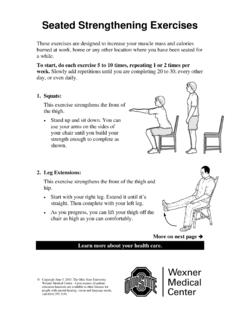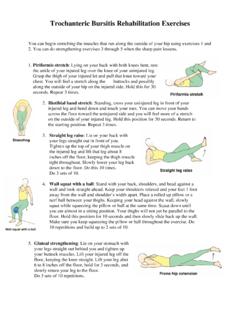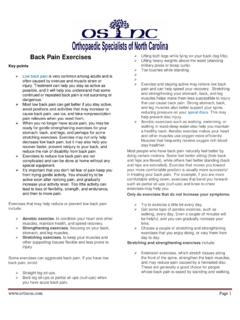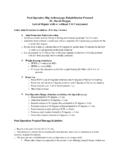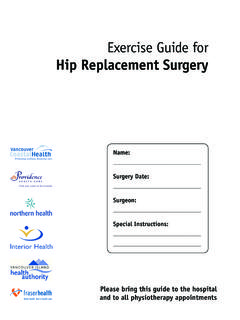Transcription of SURGICAL HIP DISLOCATION SURGERY - John Clohisy MD.
1 SURGICAL Hip DISLOCATION Before and After Your SURGERY 1 SURGICAL HIP DISLOCATION SURGERY It is important to us that all of our patients know what to expect before SURGERY , during their hospitalization and after SURGERY . Office Visits Planning begins with your first visit. At this visit, x-rays of your hip, a health history, including current medications and other medical problems, are discussed. The objective of the first office visit is to determine whether hip SURGERY is necessary. This decision is based on many factors including the degree of pain, the severity of limp, extent of activity restriction and your overall dissatisfaction with your hip condition.
2 Your current health status is also an important consideration. After evaluating your x-rays and performing a complete physical exam, Dr. Clohisy will discuss the relative advantages and disadvantages of the SURGICAL procedure and the expected outcome. Radiography You may already have x-rays of your hips, but we may request that new x-rays are taken. Specific views with the hip in various positions are necessary so we can define the bony anatomy of the hip and make individual plans for SURGERY . X-rays are also used during SURGERY in order to assure optimal correction of the hip.
3 Scheduling SURGERY Once a decision has been made to have SURGERY , we will schedule the procedure. Several factors influence the SURGERY date. The most important factors are your general health and time needed for an appointment with the anesthesia department. The anesthesia department requires each patient to go through pre-admission testing. This testing is done at The Center for Preoperative Assessment and Planning (CPAP). This testing will be scheduled for you through Dr. Clohisy s office. This will be done within one month of SURGERY . A full history and physical is obtained at this visit.
4 Any other test that may be required is also SURGICAL Hip DISLOCATION Before and After Your SURGERY 2 done, such as, blood work, urine tests, chest x-ray, or EKG. You will discuss with the anesthesia providers your plan of care for anesthesia. We will also help you obtain the necessary equipment needed to maintain your independence and hip precautions after SURGERY . This includes a hip kit and a raised toilet seat with arms. They are provided on-site for your convenience or you may order from any equipment company. Most medical insurance plans do not pay for these particular items.
5 SURGICAL Hip DISLOCATION Before and After Your SURGERY 3 PRE- SURGERY INSTRUCTIONS: Begin taking an iron supplement one time a day with meals. Start one month prior to your SURGERY date. Leave money, jewelry, and other valuables at home. We will have you remove fingernail polish, makeup, hair accessories, jewelry, glasses, contact lenses or anything else removable from your body. If you take NSAID s (ie. Aleve, Ibuprofen, Advil, Celebrex, Voltaren, Relafen), aspirin or aspirin containing medication, vitamins and herbal supplements, or a blood thinner you must stop one week prior to SURGERY .
6 Stop birth control pills (BCPs) at end of the last menstrual cycle prior to SURGERY . Stay off BCP for two cycles. Another form of contraception should be used. You must be healthy and free of any cold or infections. DO NOT EAT OR DRINK ANYTHING AFTER MIDNIGHT BEFORE YOUR SURGERY . Follow skin preparation instructions. Either using the Scrub Care given from the CPAP department or liquid antibacterial soap: Take a shower the night before, sleep in clean sheets and pajamas and take another shower day of SURGERY . SURGICAL Hip DISLOCATION Before and After Your SURGERY 4 SURGERY DAY AND THE HOSPITAL COURSE On the day of SURGERY , you will report to the same day SURGERY area and be checked in by the admission nurse/team.
7 You will then be assisted to a holding area where a member of the anesthesia team will start an IV line in your arm and your anesthesia plan. You will also meet the operative team. During SURGERY your family will be asked to wait in the SURGICAL waiting area. A receptionist will be available to answer questions and keep family members posted on progress as the operative team informs them every two hours. After SURGERY you will be taken to the post anesthesia care unit (PACU). Most patients stay in the PACU for two or three hours before going to the orthopaedic inpatient unit (7300 or 7400).
8 Orthopaedic Unit Admission Upon arriving to the orthopedic floor, a nurse will review your history and SURGERY performed. The nurse will familiarize you with your room and the floor routine. Your vital signs will be checked as ordered by your surgeon. Active care pumps on your calves will be used to help prevent blood clots. The incision will be covered by a bandage. There will be SURGICAL drainage tubes from underneath the bandage that collects blood from the wound. An IV will be used to administer antibiotics, pain medication and blood transfusions. You may receive oxygen through nasal cannula for 24 hours to help you breathe.
9 Vital signs will be taken frequently and will become routine after the first several hours. Pain Management Immediately following SURGERY , we will manage your discomfort by using IV and oral pain medications. You will begin to feel progressively better each day and the postoperative discomfort will diminish. During the first and second postoperative days your pain medicine will be changed to oral pills. SURGICAL Hip DISLOCATION Before and After Your SURGERY 5 Postoperative Physical Therapy You will get up to a chair the night of SURGERY . On the first day following SURGERY , all patients will start physical and occupational therapy.
10 You will be touch-down weight-bearing at this point and have certain hip precautions. The physical and occupational therapist will show you all your restrictions and exercises including gait training with an assistive device. They will also work with your activities of daily living and show you how to ascend and descend stairs. A CPM machine will be used for gentle motion of the hip. Discharge Planning Before discharge home, a case coordinator will be assigned to each patient and will make sure that the patient receives physical therapy in the hospital, family training on how to manage at home, and necessary home care services.

